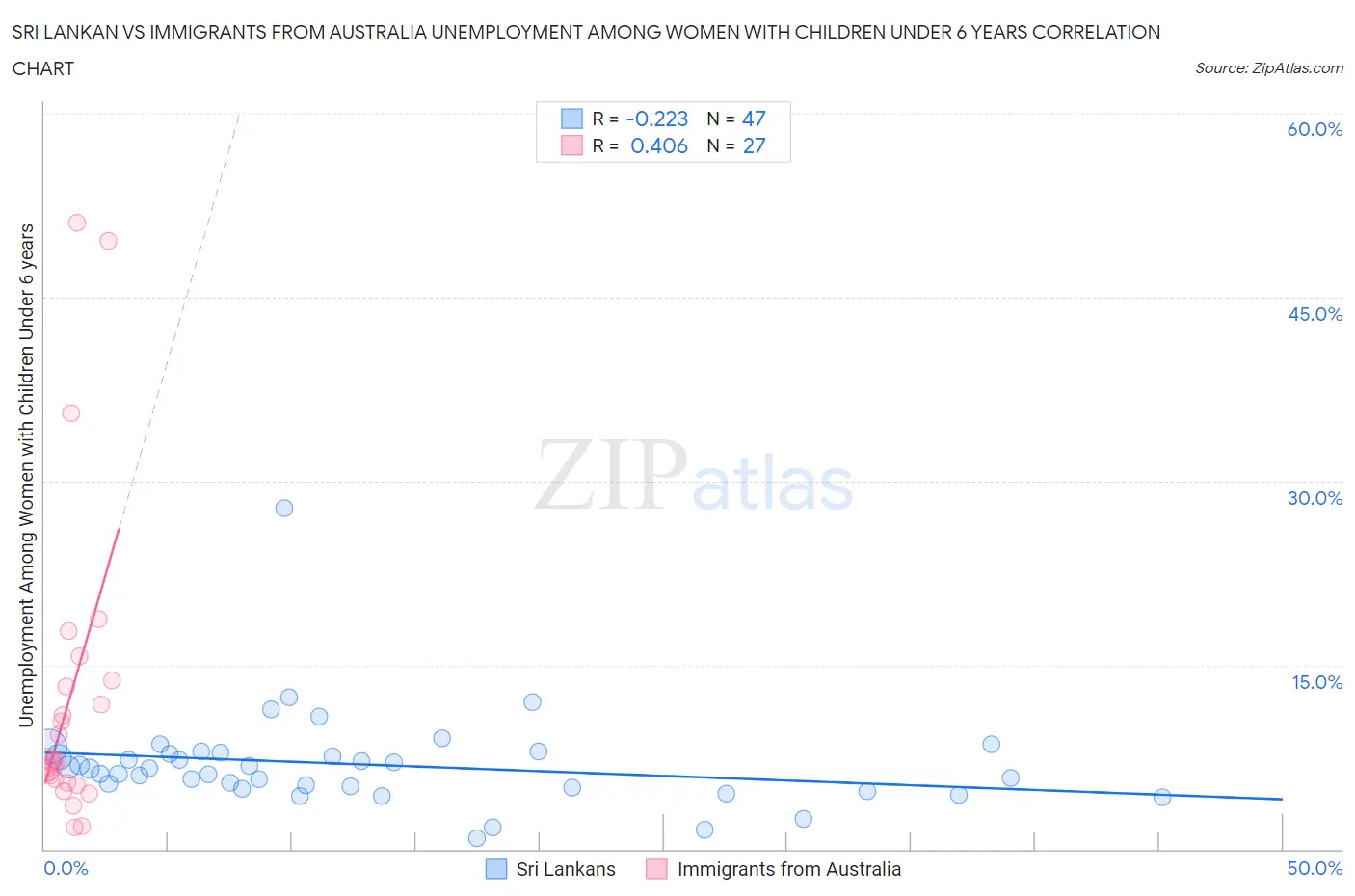Sri Lankan vs Immigrants from Australia Unemployment Among Women with Children Under 6 years
COMPARE
Sri Lankan
Immigrants from Australia
Unemployment Among Women with Children Under 6 years
Unemployment Among Women with Children Under 6 years Comparison
Sri Lankans
Immigrants from Australia
6.6%
UNEMPLOYMENT AMONG WOMEN WITH CHILDREN UNDER 6 YEARS
100.0/ 100
METRIC RATING
37th/ 347
METRIC RANK
6.8%
UNEMPLOYMENT AMONG WOMEN WITH CHILDREN UNDER 6 YEARS
99.9/ 100
METRIC RATING
45th/ 347
METRIC RANK
Sri Lankan vs Immigrants from Australia Unemployment Among Women with Children Under 6 years Correlation Chart
The statistical analysis conducted on geographies consisting of 330,167,868 people shows a weak negative correlation between the proportion of Sri Lankans and unemployment rate among women with children under the age of 6 in the United States with a correlation coefficient (R) of -0.223 and weighted average of 6.6%. Similarly, the statistical analysis conducted on geographies consisting of 185,332,554 people shows a moderate positive correlation between the proportion of Immigrants from Australia and unemployment rate among women with children under the age of 6 in the United States with a correlation coefficient (R) of 0.406 and weighted average of 6.8%, a difference of 1.6%.

Unemployment Among Women with Children Under 6 years Correlation Summary
| Measurement | Sri Lankan | Immigrants from Australia |
| Minimum | 0.90% | 1.8% |
| Maximum | 27.8% | 51.1% |
| Range | 26.9% | 49.3% |
| Mean | 6.9% | 12.5% |
| Median | 6.5% | 7.2% |
| Interquartile 25% (IQ1) | 5.0% | 5.4% |
| Interquartile 75% (IQ3) | 7.9% | 13.7% |
| Interquartile Range (IQR) | 2.9% | 8.3% |
| Standard Deviation (Sample) | 3.9% | 12.9% |
| Standard Deviation (Population) | 3.9% | 12.6% |
Demographics Similar to Sri Lankans and Immigrants from Australia by Unemployment Among Women with Children Under 6 years
In terms of unemployment among women with children under 6 years, the demographic groups most similar to Sri Lankans are Hmong (6.7%, a difference of 0.13%), Immigrants from Russia (6.7%, a difference of 0.19%), Luxembourger (6.6%, a difference of 0.25%), Yakama (6.6%, a difference of 0.32%), and Asian (6.7%, a difference of 0.41%). Similarly, the demographic groups most similar to Immigrants from Australia are Iranian (6.7%, a difference of 0.060%), Latvian (6.8%, a difference of 0.24%), Immigrants from Asia (6.8%, a difference of 0.41%), Immigrants from Switzerland (6.8%, a difference of 0.44%), and Immigrants from Nepal (6.8%, a difference of 0.49%).
| Demographics | Rating | Rank | Unemployment Among Women with Children Under 6 years |
| Immigrants | Moldova | 100.0 /100 | #31 | Exceptional 6.6% |
| Tsimshian | 100.0 /100 | #32 | Exceptional 6.6% |
| Immigrants | Vietnam | 100.0 /100 | #33 | Exceptional 6.6% |
| Immigrants | South Central Asia | 100.0 /100 | #34 | Exceptional 6.6% |
| Yakama | 100.0 /100 | #35 | Exceptional 6.6% |
| Luxembourgers | 100.0 /100 | #36 | Exceptional 6.6% |
| Sri Lankans | 100.0 /100 | #37 | Exceptional 6.6% |
| Hmong | 100.0 /100 | #38 | Exceptional 6.7% |
| Immigrants | Russia | 100.0 /100 | #39 | Exceptional 6.7% |
| Asians | 100.0 /100 | #40 | Exceptional 6.7% |
| Immigrants | Indonesia | 99.9 /100 | #41 | Exceptional 6.7% |
| Immigrants | Cuba | 99.9 /100 | #42 | Exceptional 6.7% |
| Bhutanese | 99.9 /100 | #43 | Exceptional 6.7% |
| Iranians | 99.9 /100 | #44 | Exceptional 6.7% |
| Immigrants | Australia | 99.9 /100 | #45 | Exceptional 6.8% |
| Latvians | 99.9 /100 | #46 | Exceptional 6.8% |
| Immigrants | Asia | 99.9 /100 | #47 | Exceptional 6.8% |
| Immigrants | Switzerland | 99.9 /100 | #48 | Exceptional 6.8% |
| Immigrants | Nepal | 99.9 /100 | #49 | Exceptional 6.8% |
| Immigrants | Ireland | 99.9 /100 | #50 | Exceptional 6.8% |
| Ethiopians | 99.9 /100 | #51 | Exceptional 6.8% |